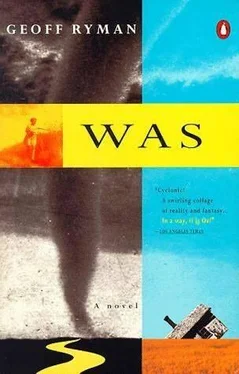But the photographs showed a burly, tough-looking boy. The Corndale house was growing around him in stages. He would stand chuckling amid its wooden skeleton holding a hammer, a wild destructive light in his eyes. He was a hefty little brute who looked as if he would grow up round and small and hearty. Jonathan had grown up to be tall and thin, distant and mild.
The little thug looked wonderfully happy. Jonathan the adult was tempted to say insanely happy. The eyes sometimes seemed to be stricken with a faraway vision, fogged with wonder. The smile sometimes blazed beyond delight. Something broken would be clutched in his stained and brutish, pudgy fist. The smiles of his parents would be sideways and nervous.
Jonathan needed reminding that Dr. Montemuro in Streetsville had diagnosed him as being autistic.
Jonathan had smiled and Jonathan had rocked. He would sit on the floor cross-legged and rock back and forth for hours. Jonathan the adult could not sit cross-legged at all.
The bad little boy had rocked himself to sleep each night. He threw himself back and forth, until the cot swayed dangerously, wood creaking. His parents said they had built the extension to give themselves a separate room in which to sleep. The rocking was very noisy, particularly as the little boy hummed and keened to himself. The songs would be wild, tuneless, like the crying of a bird, his mother said. He shook his head from side to side as if denying the world. He would fall asleep from sheer exhaustion.
He ripped his sheets. He tore holes in them big enough to crawl through. His mother thought it was his constant nightly exertions. In fact, he tore them quite deliberately with a guilty, almost sexual delight. He would work a small tear in the center and gradually prize it open.
He was trying to make a hole big enough to climb through. It was as though the sheet were a screen that separated him from somewhere else. When the hole was large enough, he would climb through it, hoping to emerge somewhere wonderful. It was a disappointment to him, to find himself still alone in his room. He kept on tearing sheets.
He was subject to fits of blinding rage.
He broke his Indian bow and arrow quite coldly out of hatred for something he did not understand. It was terrible because he had truly loved his Indian bow and arrow. He was stricken with remorse.
"Is that your bow? Your new bow?" his mother demanded, invisible from within the house. He wept as he held it up, like a broken bird.
"Well, this time your father is not going to fix it for you."
He hid under his Indian blanket in the driveway. He knew his father would coast into the driveway, up and over it, over him.
"You stupid child! Don't you ever do that again!" his mother said in alarm, shaking him, her eyes wide and fearful. Jonathan's face was covered in the red crushed juice of berries, as if he were bleeding.
What kind of kid was that? Jonathan asked himself, remembering. And why did he look so happy?
His earliest memory was of being small enough to be bathed in the bathroom sink. He kept striking the warm water, to make it splash over him. "Oooh, lovely warm water," his mother cooed. He understood her. He said something in reply, in the language of childhood, a series of sounds. His mother didn't understand him. Why not?
Jonathan could remember the moment of dismay when the infant realized that he would have to use the same word each time for the same thing. He could remember the horror: he realized the size of the task ahead of him. He became enraged with disappointment. The world should work so that everyone understood out of love, as he did.
Jonathan did not begin to speak until he was three years old. He was angry. He rejected the world out of rage.
The scrawls he made on the walls were writing without words, messages in Crayola and lipstick. "Walt Disney owns Cinderella and Mickey Mouse and Disneyland too," the scrawls would say in the swirling shapes of cyclones.
When Jonathan finally decided to speak, it was in a complete sentence. He had been able to speak all along. Every family has its legends, and this was one his mother was pleased to relate, entertaining visitors.
"I nearly died!" his mother might say, laughing and shaking her head. "Three years without saying a word, and suddenly he asks for a glass of water! After that his nose was never out of a book!" The implication for listeners was that Jonathan's extraordinary verbal skills were somehow brewing in that silence.
Throughout Jonathan's later career as a good little boy, his teachers expressed satisfaction with his ability to write, to speak, to act in schoolroom plays. In the tests they gave to measure potential, Jonathan scored, frankly, at near-genius level on verbal reasoning. On the strength of his verbal reasoning alone, Jonathan kept skipping grades until his skills matched the work load and he fell forever behind in mathematics.
The bad little boy's talents had not been verbal, but lay in the realm of color and shape. He layered strokes of Crayola crayon, fifty-two colors, as if each stroke was the plucking of musical strings. He had masses of plasticine, a nondrying clay, which he would mold and remold, making dinosaurs or Indian tepees that seemed to have been carved out of stone.
Jonathan could remember modeling a head in clay. He was playing at the back of the house, where his father was building a patio. His father was laying large slabs of stone, chipping the edges to make them fit in a patchwork-quilt pattern. For some reason, Jonathan had been given clay, real clay instead of plasticine. Jonathan's father had artistic ambitions as well, which the clay had been meant to fulfill.
And Jonathan was suddenly seized by the idea of clay. Out of it, from nowhere, he worked the head of a caveman. Jonathan loved cavemen, loved the idea of living in rock chambers, wearing hides and talking in grunts.
Jonathan the adult could still remember the caveman's face, his apelike brows, his monkey nose, his hedgehog ears and, above all, his expression. The flesh around his eyes was crinkled, ready to blink in dismay at the modern world into which he had strayed. The lips were half-open, as if the caveman were making up his mind to speak.
The tough little boy had even been sociable, in his own way. Hovering around the edges of the memory was another little boy called Robby Polk, who lived across the field. Jonathan's relationship with Robby was uneasy. Both of them liked to win, but Robby was better at it.
Robby looked at the caveman head and said, "That's lousy."
Jonathan was pleased. He felt he had caught Robby, trapped him into being petty. Jonathan's father had no kiln in which to bake the head. When the caveman finally dried, he split down the middle. Jonathan knew what Robby would say.
"Good," said Robby, and Jonathan knew he had made him look small. He smiled and looked away and pretended Robby was not there.
His mother looked at the caveman head and stroked Jonathan's disordered hair and said, "There are always compensations."
The bad little boy hated most books. He tore up the ones he didn't like. They were written by adults for children. Jonathan knew that not because anyone told him, but because he sensed it in the books themselves. They were not written for children at all. He tore up a library book called Anatole. It was about a French mouse and it told cheese jokes about Camembert and Roquefort. That was a joke for adults. What child would know anything about French cheese? Why write books for children if you knew nothing about them, if you were really writing for adults?
There were honorable exceptions. He loved a book about a monkey, called Curious George. George kept getting into trouble, breaking things. Jonathan also loved a book called Space Cat. It was rather long-winded, and Jonathan would torment himself by forcing his way through the languorous opening. It was about a cat and a space pilot who became friends. They went to the moon and Space Cat had his own spacesuit, with a sausage-shaped piece for his tail. On the moon, there were floating silver globes, full of light, that were alive.
Читать дальше












